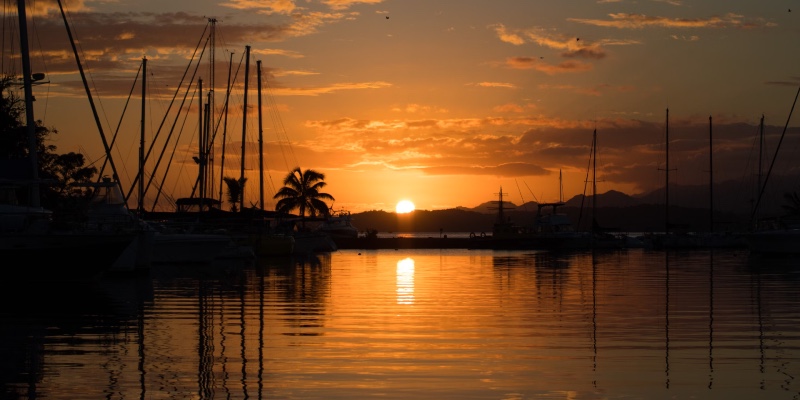Hey, it’s a long winter for some of us! And so we start to dream of places like Fiji, that charmed South Pacific Isle, 1,300 miles from New Zealand, an archipelago of over 330 islands, about only a hundred are permanently inhabited. About three-quarters of the 920,000 Fijians live on the island of Viti Levu’s coasts, mostly in the capital city of Suva. Surely, it’s an idyll of peace and calm with no crime at all for us to write about? Turns out there’s some….
Nilima Rao’s A Disappearance in Fiji (2023) is set in 1914 . Sergeant Akal Singh would rather be anywhere than this tropical paradise – or, as he calls it, ‘this godforsaken island’. After a promising start to his police career in Hong Kong, Akal has been sent to the far-flung colony of Fiji as punishment for a humiliating professional mistake. Lonely and embarrassed, he dreams of solving a big case, thereby redeeming himself and gaining permission to leave. Otherwise, he fears he will be stuck in Fiji for ever. Then an indentured Indian woman goes missing from a sugarcane plantation and Fiji’s newspapers scream ‘kidnapping’ and Singh has his big case to crack. Nilima Rao is a Fijian Indian Australian and A Disappearance in Fiji is her first novel but there will apparently be more of Akal Singh in the future. A Shipwreck in Fiji is published in June 2025 – set in 1915 with a purported sighting of a German ship approaching Fiji as World War One comes to the South Pacific. Sergeant Akal Singh, based in Suva, is sent to visit the neighbouring island of Ovalau to investigate the sightings.
B.M. Allsopp is the author of the five-book Fiji Islands Mysteries series. She’s an Australian who lived in the South Pacific islands for fourteen years, including four in Fiji where she worked at the University of the South Pacific in Suva. The series features DI Joe Horseman – a washed-up rugby hero (rugby is a BIG sport in Fiji BTW) and detective and Detective Sergeant Susie Singh (just to note that between 1879 and 1916, when Fiji was a British colony Indians were brought to Fiji as indentured laborers to work on Fiji’s sugar plantations). In the first book in the series Death on Paradise Island (2016) Horseman and Singh discover a young maid’s corpse snagged on the reef. In Death by Tradition (2018) an anti-mining activist is murdered at Tanoa in Fiji’s remote highlands where an ancient crime that still haunts the present. Next, in Death Beyond the Limit (2020) a corpse, or at least bits of one, are fished out of a shark’s gut. The question for Horseman and Singh is was the victim dead when the shark snacked on him? In Death Sentence (2021) there’s riots in Suva over the early release of a hated local killer. Horseman and Singh have the unenviable and unpopular job of protecting the man from the mob. And finally, in Death Off Camera (2023) death strikes the contestants in a reality TV game show being filmed in Fiji. All-in-all Allsopp Fiji Islands Mysteries series is a great way to get into the geography and society of Fiji, its capital Suva particularly, and some good crime writing too.
Bang up to date is Lucy Clarke’s The Castaways (2021). Two sisters from London (Lori and Erin) are scheduled to fly to the remote island of Limaji in the Fijian archipelago. But things go awry quickly – next to the wreck of a plane, a stranger paces. Another sharpens a knife, scoring a list of the dead onto a palm tree. Others watch from the shadows of a campfire – all with untold stories, and closely-guarded secrets. The Castaways was recently filmed with UK TV star Sheridan Smith as a five-part thriller Paramount+.
Joseph C Veramu is a Fijian writer and his 1994 novel Moving Through the Streets captures the colloquial street slang and attitudes of young working-class Suva brilliantly. The action is quick as the novel follows a group of teenagers in an urban environment rife with criminal temptation and opportunity. Veramu is a lecturer at the University of the South Pacific whose work has included studying young people’s lives in Solevu on Fiji’s Malolo Island. He comes originally from the relatively poor and tough area of Raiwaqa in Suva.
And finally…. As usual something a bit different Sugar (2024) is an ethnographic novel written by two Australian-based researchers: political analyst Edward Narain and medical anthropologist Tarryn Phillips that draws on their respective research and lived experience. Narain is descended from Indian indentured labourers. Sugar follows the lives of three main characters in the lead up and aftermath of the cyclone: Hannah a naïve but well-intentioned Australian health volunteer, Rishika a jaded, Indo-Fijian, amateur historian, and Isikeli a troubled Fijian (iTaukei) teen caring for his diabetic grandmother. These three live very different lives, shaped by gender, class/caste and ethnic differences. Isikeli is one of the “coconut boys”, disenfranchised youth who collect and sell coconuts. By night, he is a petty criminal. Rishika’s husband was murdered as Cyclone Dorothy swept through the island causing chaos. Isikeli is accused of murder and the others must help him prove his innocence. A murder mystery on several levels but also a study of the damage the legacy of indentured labour and the sugar industry cultivated in Fiji still does – massively high rates of diabetes for a start, but also displacement, crime, inter-ethnic strife. The novel tells the stories of indentured labourers and the rise of the great industry of sugar propelled by vast profits and empire as the world’s sweet tooth demands more. Sugar is a book about crimes, about Fiji and about its people that is well worth reading if you know little of the country and what shaped its history and society.

















